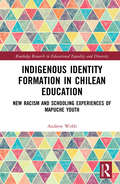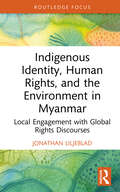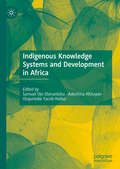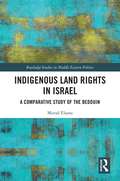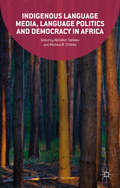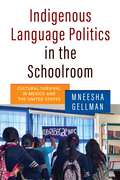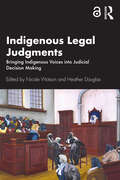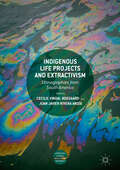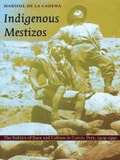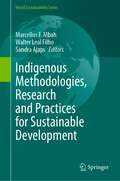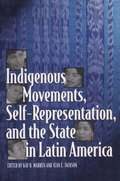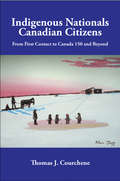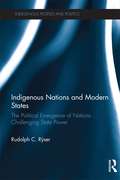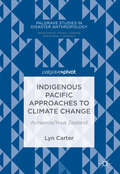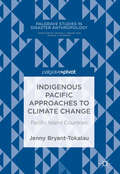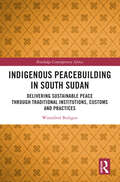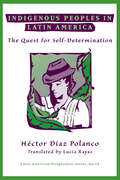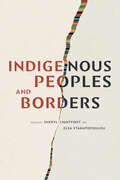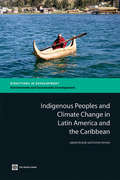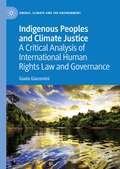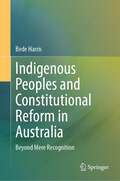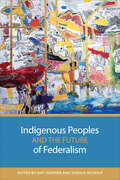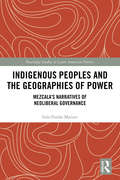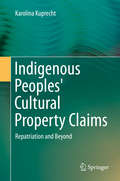- Table View
- List View
Indigenous Identity Formation in Chilean Education: New Racism and Schooling Experiences of Mapuche Youth (Routledge Research in Educational Equality and Diversity)
by Andrew WebbThis book offers rich sociological analysis of the ways in which educational institutions influence indigenous identity formation in Chile. In doing so, Webb explores the mechanisms of new racism in schooling and demonstrates how continued forms of exclusion impact minority groups. By drawing on qualitative research conducted with Mapuche youth in schools in rural and urban settings, and in private state-subsidised and public schools, this volume provides a comprehensive exploration of how national belonging and indigeneity are articulated and experienced in institutional contexts. Close analysis of student and teacher narratives illustrates the reproduction of historically constructed ethnic and racial criteria, and demonstrates how these norms persist in schools, despite apparently progressive attitudes toward racism and colonial education in Chile. This critical perspective highlights the continued prevalence of implicit racism whereby schooling produces culturally subjective and exclusionary norms and values. By foregrounding contemporary issues of indigenous identity and education in Chile, this book adds important scholarship to the field. The text will be of interest to researchers, academics, and scholars in the fields of indigenous education, sociology of education, and international and comparative education.
Indigenous Identity, Human Rights, and the Environment in Myanmar: Local Engagement with Global Rights Discourses (Routledge Focus on Environment and Sustainability)
by Jonathan LiljebladThis book draws on the experiences of the indigenous movement in Myanmar to explore how the local construction of indigenous identities connects communities to global mechanisms for addressing human rights and environmental issues. Various communities in Myanmar have increasingly adapted international discourses of indigenous identity as a vehicle to access international legal mechanisms to address their human rights and environmental grievances against the Myanmar state. Such exercise of global discourses overlays historical endemic struggles of diverse peoples involving intersectional issues of self- determination, cultural survival, and control over natural resources. This book draws implications for the intersectionality of local and global theoretical discourses of indigeneity, human rights, and environment. It uses such implications to identify attendant issues for the aspirations of international human rights and environmental efforts and the practice of their associated international legal mechanisms. This book informs readers of the agency and capabilities of communities in underdeveloped countries to engage different global mechanisms to address local grievances against their states. Readers will develop a more critical understanding of the issues posed by the local construction of indigeneity for the ideals and practice of international efforts regarding human rights and the environment. This book will be of great interest to students and scholars of indigenous studies, human rights, international law, Asian studies, development studies, and the environment.
Indigenous Knowledge Systems and Development in Africa
by Samuel Ojo Oloruntoba Adeshina Afolayan Olajumoke Yacob-HalisoThis edited volume analyzes African knowledge production and alternative development paths of the region. The contributors demonstrate ways in which African-centered knowledge refutes stereotypes depicted by Euro-centric scholars and, overall, examine indigenous African contributions in global knowledge production and development. The project provides historical and contemporary evidences that challenge the dominance of Euro-centric knowledge, particularly, about Africa, across various disciplines. Each chapter engages with existing scholarship and extends it by emphasizing on Indigenous knowledge systems in addition to future indicators of African knowledge production.
Indigenous Land Rights in Israel: A Comparative Study of the Bedouin (Routledge Studies in Middle Eastern Politics)
by Morad ElsanaIntroducing the Negev–Bedouin land issue from the international indigenous land rights perspective, this comparative study suggests options for the recognition of their land. The book demonstrates that the Bedouin land dispossession, like many indigenous peoples’, progressed through several phases that included eviction and displacement, legislation, and judicial decisions that support acts of dispossession and deny the Bedouin’s traditional land rights. Examining the Mawat legal doctrine on which the State and the Court rely on to deny Bedouin land rights, this volume introduces the relevant international law protecting indigenous land rights and shows how the limitations of this law prevent any meaningful protection of Bedouin land rights. In the second part of the work, the Aborigines’ land in Australia is introduced as an example of indigenous peoples' successful struggle for their traditional land rights. The final chapter analyzes the basic elements of judicial recognition of the land and shows that the basic elements needed for Bedouin land recognition exist in the Israeli legal system. Proposing practical recommendations for the recognition of Bedouin land, this volume is a key resource to scholars and students interested in land rights, international law, comparative studies, and the Middle East.
Indigenous Language Media, Language Politics and Democracy in Africa
by Abiodun Salawu Monica Chibita SarantakosThis book deals with the often-neglected link between indigenous languages, media and democracy in Africa. It recognizes that the media plays an amplifying role that is vital to modern-day expression, public participation and democracy but that without the agency to harness media potential, many Africans will be excluded from public discourse.
Indigenous Language Politics in the Schoolroom: Cultural Survival in Mexico and the United States
by Mneesha GellmanPublic school classrooms around the world have the power to shape and transform youth culture and identity. In this book, Mneesha Gellman examines how Indigenous high school students resist assimilation and assert their identities through access to Indigenous language classes in public schools. Drawing on ethnographic accounts, qualitative interviews, focus groups, and surveys, Gellman’s fieldwork examines and compares the experiences of students in Yurok language courses in Northern California and Zapotec courses in Oaxaca, Mexico. She contends that this access to Indigenous language instruction in secondary schooling serves as an arena for Indigenous students to develop their sense of identity and agency, and provides them tools and strategies for civic, social, and political participation, sometimes in unexpected ways.Showcasing young people’s voices, and those of their teachers and community members, in the fight for culturally relevant curricula and educational success, Gellman demonstrates how the Indigenous language classroom enables students to understand, articulate, and resist the systemic erasure and destruction of their culture embedded in state agendas and educational curricula. Access to Indigenous language education, she shows, has positive effects not only for Indigenous students, but for their non-Indigenous peers as well, enabling them to become allies in the struggle for Indigenous cultural survival. Through collaborative methodology that engages in research with, not on, Indigenous communities, Indigenous Language Politics in the Schoolroom explores what it means to be young, Indigenous, and working for social change in the twenty-first century.
Indigenous Legal Judgments: Bringing Indigenous Voices into Judicial Decision Making
by Nicole Watson and Heather DouglasThis book is a collection of key legal decisions affecting Indigenous Australians, which have been re-imagined so as to be inclusive of Indigenous people’s stories, historical experience, perspectives and worldviews. In this groundbreaking work, Indigenous and non-Indigenous scholars have collaborated to rewrite 16 key decisions. Spanning from 1889 to 2017, the judgments reflect the trajectory of Indigenous people’s engagements with Australian law. The collection includes decisions that laid the foundation for the wrongful application of terra nullius and the long disavowal of native title. Contributors have also challenged narrow judicial interpretations of native title, which have denied recognition to Indigenous people who suffered the prolonged impacts of dispossession. Exciting new voices have reclaimed Australian law to deliver justice to the Stolen Generations and to families who have experienced institutional and police racism. Contributors have shown how judicial officers can use their power to challenge systemic racism and tell the stories of Indigenous people who have been dehumanised by the criminal justice system. The new judgments are characterised by intersectional perspectives which draw on postcolonial, critical race and whiteness theories. Several scholars have chosen to operate within the parameters of legal doctrine. Some have imagined new truth-telling forums, highlighting the strength and creative resistance of Indigenous people to oppression and exclusion. Others have rejected the possibility that the legal system, which has been integral to settler-colonialism, can ever deliver meaningful justice to Indigenous people.
Indigenous Legal Judgments: Bringing Indigenous Voices into Judicial Decision Making
by Nicole Watson and Heather DouglasThis book is a collection of key legal decisions affecting Indigenous Australians, which have been re-imagined so as to be inclusive of Indigenous people’s stories, historical experience, perspectives and worldviews.In this groundbreaking work, Indigenous and non-Indigenous scholars have collaborated to rewrite 16 key decisions. Spanning from 1889 to 2017, the judgments reflect the trajectory of Indigenous people’s engagements with Australian law. The collection includes decisions that laid the foundation for the wrongful application of terra nullius and the long disavowal of native title. Contributors have also challenged narrow judicial interpretations of native title, which have denied recognition to Indigenous people who suffered the prolonged impacts of dispossession. Exciting new voices have reclaimed Australian law to deliver justice to the Stolen Generations and to families who have experienced institutional and police racism. Contributors have shown how judicial officers can use their power to challenge systemic racism and tell the stories of Indigenous people who have been dehumanised by the criminal justice system.The new judgments are characterised by intersectional perspectives which draw on postcolonial, critical race and whiteness theories. Several scholars have chosen to operate within the parameters of legal doctrine. Some have imagined new truth-telling forums, highlighting the strength and creative resistance of Indigenous people to oppression and exclusion. Others have rejected the possibility that the legal system, which has been integral to settler-colonialism, can ever deliver meaningful justice to Indigenous people.The Open Access version of this book, available at http://www.taylorfrancis.com, has been made available under a Creative Commons Attribution-Non Commercial-No Derivatives (CC-BY-NC-ND) 4.0 license.
Indigenous Life Projects and Extractivism: Ethnographies from South America (Approaches to Social Inequality and Difference)
by Cecilie Vindal Ødegaard Juan Javier Rivera AndíaExploring indigenous life projects in encounters with extractivism, the present open access volume discusses how current turbulences actualise questions of indigeneity, difference and ontological dynamics in the Andes and Amazonia. While studies of extractivism in South America often focus on wider national and international politics, this contribution instead provides ethnographic explorations of indigenous politics, perspectives and worlds, revealing loss and suffering as well as creative strategies to mediate the extralocal. Seeking to avoid conceptual imperialism or the imposition of exogenous categories, the chapters are grounded in the respective authors’ long-standing field research. The authors examine the reactions (from resistance to accommodation), consequences (from anticipation to rubble) and materials (from fossil fuel to water) diversely related to extractivism in rural and urban settings. How can Amerindian strategies to preserve localised communities in extractivist contexts contribute to ways of thinking otherwise?
Indigenous Mestizos: The Politics of Race and Culture in Cuzco, Peru, 1919–1991
by Marisol de la CadenaIn the early twentieth century, Peruvian intellectuals, unlike their European counterparts, rejected biological categories of race as a basis for discrimination. But this did not eliminate social hierarchies; instead, it redefined racial categories as cultural differences, such as differences in education or manners. In Indigenous Mestizos Marisol de la Cadena traces the history of the notion of race from this turn-of-the-century definition to a hegemony of racism in Peru.De la Cadena's ethnographically and historically rich study examines how indigenous citizens of the city of Cuzco have been conceived by others as well as how they have viewed themselves and places these conceptions within the struggle for political identity and representation. Demonstrating that the terms Indian and mestizo are complex, ambivalent, and influenced by social, legal, and political changes, she provides close readings of everyday concepts such as marketplace identity, religious ritual, grassroots dance, and popular culture, as well as of such common terms as respect, decency, and education. She shows how Indian has come to mean an indigenous person without economic and educational means--one who is illiterate, impoverished, and rural. Mestizo, on the other hand, has come to refer to an urban, usually literate, and economically successful person claiming indigenous heritage and participating in indigenous cultural practices. De la Cadena argues that this version of de-Indianization--which, rather than assimilation, is a complex political negotiation for a dignified identity--does not cancel the economic and political equalities of racism in Peru, although it has made room for some people to reclaim a decolonized Andean cultural heritage.This highly original synthesis of diverse theoretical arguments brought to bear on a series of case studies will be of interest to scholars of cultural anthropology, postcolonialism, race and ethnicity, gender studies, and history, in addition to Latin Americanists.
Indigenous Methodologies, Research and Practices for Sustainable Development (World Sustainability Series)
by Walter Leal Filho Marcellus F. Mbah Sandra AjapsThis book states that whilst academic research has long been grounded on the idea of western or scientific epistemologies, this often does not capture the uniqueness of Indigenous contexts, and particularly as it relates to the achievement of the United Nations Sustainable Development Goals (SDGs). The SDGs were announced in 2015, accompanied by 17 goals and 169 targets. These goals are the means through which Agenda 2030 for sustainable development is to be pursued and realised over the next 15 years, and the contributions of Indigenous peoples are essential to achieving these goals.Indigenous peoples can be found in practically every region of the world, living on ancestral homelands in major cities, rainforests, mountain regions, desert plains, the arctic, and small Pacific Islands. Their languages, knowledges, and values are rooted in the landscapes and natural resources within their territories.However, many Indigenous peoples are now minorities within their homelands and globally, and there is a dearth of research based on Indigenous epistemologies and methodologies. Furthermore, academic research on Indigenous peoples is typically based on western lenses. Thus, the paucity of Indigenous methodologies within mainstream research discourses present challenges for implementing practical research designs and interpretations that can address epistemological distinctiveness within Indigenous communities.There is therefore the need to articulate, as well as bring to the nexus of research aimed at fostering sustainable development, a decolonising perspective in research design and practice.This is what this book wants to achieve. The contributions critically reflect on Indigenous approaches to research design and implementation, towards achieving the sustainable development goals, as well as the associated challenges and opportunities. The contributions also advanced knowledge, theory, and practice of Indigenous methodologies for sustainable development.
Indigenous Movements, Self-Representation, and the State in Latin America
by Kay B. Warren Jean E. JacksonThroughout Latin America, indigenous peoples are responding to state violence and pro-democracy social movements by asserting their rights to a greater measure of cultural autonomy and self-determination. <P><P>This volume's rich case studies of movements in Colombia, Guatemala, and Brazil weigh the degree of success achieved by indigenous leaders in influencing national agendas when governments display highly ambivalent attitudes about strengthening ethnic diversity.
Indigenous Nationals, Canadian Citizens: From First Contact to Canada 150 and Beyond (Queen's Policy Studies Series #196)
by Thomas J. CourcheneIndigenous Nationals/Canadian Citizens begins with a detailed policy history from first contact to the Sesquicentennial with major emphasis on the evolution of Canadian policy initiatives relating to Indigenous peoples. This is followed by a focus on the key Supreme Court decisions that have dramatically enhanced Indigenous peoples' legal and constitutional rights. Attention is then directed to the Truth and Reconciliation Commission and the associated "Calls to Action," including their relationship to the United Nations Declaration on the Rights of Indigenous Peoples. With this as backdrop the focus turns to envisioning a brighter future for First Peoples beginning with the adoption of an analytical framework. After rejecting Indigenous nationals, Indigenous citizens (the traditional AFN position) and Canadian nationals, Canadian citizens (the Chrétien-Trudeau White Paper proposal), the chosen framework is Indigenous nationals, Canadian citizens. The two penultimate chapters address the manner in which this model has been successfully applied to the 14 Yukon First Nations as well as to the four Inuit land claims agreements. The final substantive chapter applies the Indigenous nationals, Canadian citizens model to the 70-plus First Nations in Saskatchewan (referred to as CSIN, the Commonwealth of Sovereign Indigenous Nations). In essence, CSIN would embrace provincial-type powers within, and closely integrated with, the province of Saskatchewan. Among other features, CSIN would embody the requisite degree of scale economies, self-government and property rights that are essential for Saskatchewan First Nations to successfully make the transition to Indigenous nationals and Canadian citizens.
Indigenous Nations and Modern States: The Political Emergence of Nations Challenging State Power (Indigenous Peoples and Politics)
by Rudolph C. RyserIndigenous peoples throughout the world tenaciously defend their lands, cultures, and their lives with resilience and determination. They have done so generation after generation. These are peoples who make up bedrock nations throughout the world in whose territories the United Nations says 80 percent of the world’s life sustaining biodiversity remains. Once thought of as remnants of a human past that would soon disappear in the fog of history, indigenous peoples—as we now refer to them—have in the last generation emerged as new political actors in global, regional and local debates. As countries struggle with economic collapse, terrorism and global warming indigenous peoples demand a place at the table to decide policy about energy, boundaries, traditional knowledge, climate change, intellectual property, land, environment, clean water, education, war, terrorism, health and the role of democracy in society. In this volume Rudolph C. Ryser describes how indigenous peoples transformed themselves from anthropological curiosities into politically influential voices in domestic and international deliberations affecting everyone on the planet. He reveals in documentary detail how since the 1970s indigenous peoples politically formed governing authorities over peoples, territories and resources raising important questions and offering new solutions to profound challenges to human life.
Indigenous Pacific Approaches to Climate Change: Aotearoa/New Zealand (Palgrave Studies in Disaster Anthropology)
by Lyn CarterSituating Māori Ecological Knowledge (MEK) within traditional environmental knowledge (TEK) frameworks, this book recognizes that indigenous ecological knowledge contributes to our understanding of how we live in our world (our world views), and in turn, the ways in which humans adapt to climate change. As an industrialized nation, Aotearoa/New Zealand (A/NZ) has responsibilities and obligations to other Pacific dwellers, including its indigenous populations. In this context, this book seeks to discuss how A/NZ can benefit from the wider Pacific strategies already in place; how to meet its global obligations to reducing GHG; and how A/NZ can utilize MEK to achieve substantial inroads into adaptation strategies and practices. In all respects, Māori tribal groups here are well-placed to be key players in adaptation strategies, policies, and practices that are referenced through Māori/Iwi traditional knowledge.
Indigenous Pacific Approaches to Climate Change: Pacific Island Countries
by Jenny Bryant-TokalauThis book explores how Pacific Island communities are responding to the challenges wrought by climate change—most notably fresh water accessibility, the growing threat of disease, and crop failure. The Pacific Island nations are not alone in facing these challenges, but their responses are unique in that they arise from traditional and community-based understandings of climate and disaster. Knowledge sharing, community education, and widespread participation in decision-making have promoted social resilience to such challenges across the Pacific. In this exploration of the Pacific Island countries, Bryant-Tokalau demonstrates that by understanding the inter-relatedness of local expertise, customary resource management, traditional knowledge and practice, as well as the roles of leaders and institutions, local “knowledge-practice-belief systems” can be used to inform adaptation to disasters wherever they occur.
Indigenous Peacebuilding in South Sudan: Delivering Sustainable Peace Through Traditional Institutions, Customs and Practices (Routledge Contemporary Africa)
by Winnifred BedigenThis book explores the indigenous peace cultures of the major ethnic groups in South Sudan (Dinka, Nuer, Anuak and Acholi) and analyses their contribution to resolving the civil war. The book utilises qualitative narrative inquiry ethnographic methods to explore the indigenous institutions and customs (customary laws, beliefs and practices) employed in resolving ethnic conflicts and argues for their application in civil war resolution. This book contributes to the decolonial literature/knowledge by discussing the subtle norms, the role of youth, women, and elders, the concepts of resilience and proximity, and their significance in peacebuilding. The book shows that for sustainable peace to happen, subtle roles and disputants' indigenous knowledge should be part of national peace negotiation strategies. This book will interest NGOs, students and scholars of indigenous knowledge, women, youth, conflict and peacebuilding, African Studies and Development in the Horn of Africa and sub-Sahara regions.
Indigenous Peoples In Latin America: The Quest For Self-determination (Latin American Perspectives)
by Hector Diaz PolancoThis book deals with the perennial tensions between ethnic groups and the modern nation-state and does so from the perspective of a leading Mexican anthropologist with deep and long experience in these matters. As such, it is both a superb introduction to the basic issues and a presentation of the author's own original contributions. The appearance of this book in English gives North American readers access to these important and political currents in Latin American anthropology and political economy. It is required reading for anyone wishing to understand the current recrudescence of indigenous peoples at this moment in history?when conventional wisdom had predicted its demise.
Indigenous Peoples and Borders
by Sheryl Lightfoot and Elsa StamatopoulouThe legacies of borders are far-reaching for Indigenous Peoples. This collection offers new ways of understanding borders by departing from statist approaches to territoriality. Bringing together the fields of border studies, human rights, international relations, and Indigenous studies, it features a wide range of voices from across academia, public policy, and civil society. The contributors explore the profound and varying impacts of borders on Indigenous Peoples around the world and the ways borders are challenged and worked around. From Bangladesh’s colonially imposed militarized borders to resource extraction in the Russian Arctic and along the Colombia-Ecuador border to the transportation of toxic pesticides from the United States to Mexico, the chapters examine sovereignty, power, and obstructions to Indigenous rights and self-determination as well as globalization and the economic impacts of borders. Indigenous Peoples and Borders proposes future action that is informed by Indigenous Peoples’ voices, needs, and advocacy.Contributors. Tone Bleie, Andrea Carmen, Jacqueline Gillis, Rauna Kuokkanen, Elifuraha Laltaika, Sheryl Lightfoot, David Bruce MacDonald, Toa Elisa Maldonado Ruiz, Binalakshmi “Bina” Nepram, Melissa Z. Patel, Manoel B. do Prado Junior, Hana Shams Ahmed, Elsa Stamatopoulou, Liubov Suliandziga, Rodion Sulyandziga, Yifat Susskind, Erika M. Yamada
Indigenous Peoples and Climate Change in Latin America and the Caribbean
by Dorte Verner Jakob KronikThis book addresses the social implications of climate change and climatic variability on indigenous peoples and communities living in the highlands, lowlands, and coastal areas of Latin America and the Caribbean. Across the region, indigenous people already perceive and experience negative effects of climate change and variability. Many indigenous communities find it difficult to adapt in a culturally sustainable manner. In fact, indigenous peoples often blame themselves for the changes they observe in nature, despite their limited emission of green house gasses. Not only is the viability of their livelihoods threatened, resulting in food insecurity and poor health, but also their cultural integrity is being challenged, eroding the confidence in solutions provided by traditional institutions and authorities. The book is based on field research among indigenous communities in three major eco-geographical regions: the Amazon; the Andes and Sub-Andes; and the Caribbean and Mesoamerica. It finds major inter-regional differences in the impacts observed between areas prone to rapid- and slow-onset natural hazards. In Mesoamerican and the Caribbean, increasingly severe storms and hurricanes damage infrastructure and property, and even cause loss of land, reducing access to livelihood resources. In the Columbian Amazon, changes in precipitation and seasonality have direct immediate effects on livelihoods and health, as crops often fail and the reproduction of fish stock is threatened by changes in the river ebb and flow. In the Andean region, water scarcity for crops and livestock, erosion of ecosystems and changes in biodiversity threatens food security, both within indigenous villages and among populations who depend on indigenous agriculture, causing widespread migration to already crowded urban areas. The study aims to increase understanding on the complexity of how indigenous communities are impacted by climate change and the options for improving their resilience and adaptability to these phenomena. The goal is to improve indigenous peoples' rights and opportunities in climate change adaptation, and guide efforts to design effective and sustainable adaptation initiatives.
Indigenous Peoples and Climate Justice: A Critical Analysis of International Human Rights Law and Governance (Energy, Climate and the Environment)
by Giada GiacominiThis book provides a new interpretation of international law specifically dedicated to Indigenous peoples in the context of a climate justice approach. The book presents a critical analysis of past and current developments at the intersection of human rights and international environmental law and governance. The book suggests new ways forward and demonstrates the need for a paradigmatic shift that would enhance the meaningful participation of Indigenous peoples as fundamental actors in the conservation of biodiversity and in the fight against climate change. The book offers guidance on a number of critical intersecting and interdependent issues at the forefront of climate change law and policy – inside and outside of the UN climate change regime. The author suggests that the adoption of a critical perspective on international law is needed in order to highlight inherent structural and systemic issues of the international law regime which are all issues that ultimately impede the pursue of climate justice for Indigenous peoples.
Indigenous Peoples and Constitutional Reform in Australia: Beyond Mere Recognition
by Bede HarrisThis book examines whether Australia’s constitution should be reformed so as to enable the country to fulfil its obligations under the United Nations Declaration on the Rights of Indigenous Peoples, which it ratified in 2009. The book surveys the history of the constitutional status of Australia’s Indigenous peoples from the time of colonisation through to the current debate on ‘Indigenous constitutional recognition’. However, it argues that the term ‘Indigenous constitutional recognition', implying that mere acknowledgement of the existence of Indigenous peoples is sufficient to meet their legitimate expectations, misrepresents the nature of the project the country needs to engage in. The book argues that Australia should instead embark upon a reform programme directed towards substantive, and not merely symbolic, constitutional change. It argues that only by the inclusion in the constitution of enforceable constitutional rights can the power imbalance between Indigenous Australians and the rest of society be addressed. Taking a comparative approach and drawing upon the experience of other jurisdictions, the book proposes a comprehensive constitutional reform programme, and includes the text of constitutional amendments designed to achieve the realisation of the rights of Australia’s Indigenous peoples. It ends with a call to improve the standard of civics education so as to overcome voter apprehension towards constitutional change.
Indigenous Peoples and the Future of Federalism
by Amy Swiffen Joshua NicholsAs a settler state, Canada’s claims to sovereign control over territory are contested by Indigenous claims to land and to self-determination. Indigenous Peoples and the Future of Federalism presents legal analyses that explore forms of federalism and their potential to include multiple and divided sovereignties. This collection aims to advance reconciliation with Indigenous peoples in Canada and elsewhere by developing jurisprudence on the possibilities for a nation-to-nation relationship between Indigenous nations and Crown sovereignty. Contributors use legal creativity to explore how federalism can be structured to include the constitutional jurisdiction of Indigenous nations. Several chapters are grounded in the Canadian context while others connect the issues to international law and other settler colonial jurisdictions, recognizing how Indigenous resistance to settler laws and government decisions can at the same time be the enactment of Indigenous legalities and constitutional cultures. Ultimately, Indigenous Peoples and the Future of Federalism offers innovative ways for Canada to move forward from this challenge using existing constitutional mechanisms to give life to a plurinational Canadian federalism inclusive of the jurisdiction of Indigenous peoples.
Indigenous Peoples and the Geographies of Power: Mezcala’s Narratives of Neoliberal Governance (Routledge Studies in Latin American Politics)
by Inés Durán MatuteTracing key trends of the global-regional-local interface of power, Inés Durán Matute through the case of the indigenous community of Mezcala (Mexico) demonstrates how global political economic processes shape the lives, spaces, projects and identities of the most remote communities. Throughout the book, in-depth interviews, participant observations and text collection, offer the reader insight into the functioning of neoliberal governance, how it is sustained in networks of power and rhetorics deployed, and how it is experienced. People, as passively and actively participate in its courses of action, are being enmeshed in these geographies of power seeking out survival strategies, but also constructing autonomous projects that challenge such forms of governance. This book, by bringing together the experience of a geopolitical locality and the literature from the Latin American Global South into the discussions within the Global Northern academia, offers an original and timely transdisciplinary approach that challenges the interpretations of power and development while also prioritizing and respecting the local production of knowledge.
Indigenous Peoples' Cultural Property Claims
by Karolina KuprechtThis book analyses the legal aspects of international claims by indigenous peoples for the repatriation of their cultural property, and explores what legal norms and normative orders would be appropriate for resolving these claims. To establish context, the book first provides insights into the exceptional legislative responses to the cultural property claims of Native American tribes in the United States and looks at the possible relevance of this national law on the international level. It then shifts to the multinational setting by using the method of legal pluralism and takes into consideration international human rights law, international cultural heritage law, the applicable national laws in the United Kingdom, France and Switzerland, transnational law such as museum codes, and decision-making in extra-legal procedures. In the process, the book reveals the limits of the law in dealing with the growing imperative of human rights in the field, and concludes with three basic insights that are of key relevance for improving the law and decision-making with regard to indigenous peoples' cultural property.
